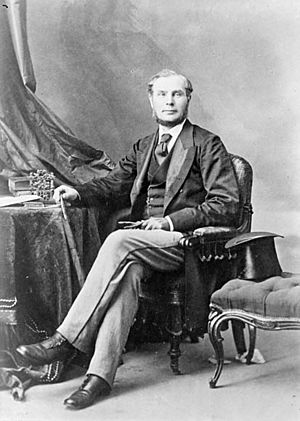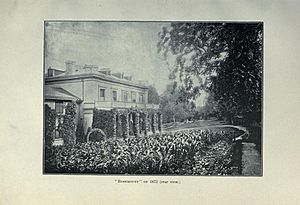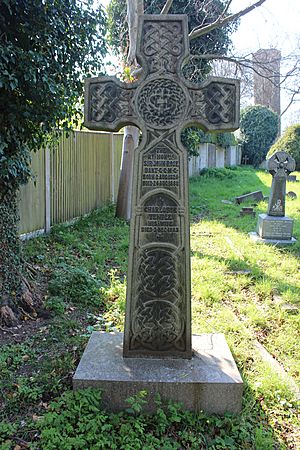Sir John Rose, 1st Baronet facts for kids
Quick facts for kids
Sir John Rose
|
|
|---|---|
 |
|
| Minister of Finance | |
| In office 18 November 1867 – 29 September 1869 |
|
| Preceded by | Alexander Galt |
| Succeeded by | Francis Hincks |
| Member of Parliament for Huntingdon, Quebec |
|
| In office 20 September 1867 – 17 November 1867 28 November 1867 – 29 September 1869 |
|
| Preceded by | New Electoral District |
| Succeeded by | Julius Scriver |
| Solicitor General for Canada East, Province of Canada | |
| In office 26 November 1857 – 1 August 1858 |
|
| Receiver General, Province of Canada | |
| In office 6 August 1858 – 7 August 1858 |
|
| Solicitor General for Canada East, Province of Canada | |
| In office 7 August 1858 – 10 January 1859 |
|
| Commissioner for Public Works, Province of Canada | |
| In office 11 January 1859 – 12 June 1861 |
|
| Member of Legislative Assembly of the Province of Canada for City of Montreal, Canada East |
|
| In office December 1857 - June 1861 |
|
| Member of Legislative Assembly of the Province of Canada for Montreal Centre, Canada East |
|
| In office 1861 - May, 1863; 1863 - June, 1867 |
|
| Personal details | |
| Born | 2 August 1820 Turriff, Aberdeenshire |
| Died | 24 August 1888 (aged 68) Langwell Forest, Ord of Caithness, Scotland |
| Nationality | Scots-Quebecer |
| Occupation | Lawyer |
Sir John Rose, 1st Baronet (born August 2, 1820 – died August 24, 1888) was an important politician. He was a Scottish person who lived in Quebec, Canada. He served in the government of the Province of Canada before it became the country we know today.
After Canada became a country in 1867, Sir John Rose held several key jobs. He was the Solicitor General of Canada, the Minister of Public Works, and the Minister of Finance. He also worked for the British government in the United Kingdom.
In 1872, he was given the special title of 1st Baronet Rose, of Montreal. This title could be passed down in his family. His home in Montreal from 1848 was called Rosemount. Later, from 1872, he lived in England at Loseley Park.
Contents
Early Life and Education
John Rose was born on August 2, 1820, in a place called Gask, near Turriff, in Aberdeenshire, Scotland. His father was William Rose, and his mother was Elizabeth Fyfe. John's family had a long history, connected to the Clan Rose in Scotland.
He went to school at Udny Academy and later studied at King's College, Aberdeen in Scotland.
Political Career in Canada
In 1836, when he was 16, John Rose moved to Huntingdon, Quebec. At that time, this area was known as Lower Canada. He helped to calm things down during the Lower Canada Rebellion in 1837.
He became a lawyer in 1842 and started his own law business in Montreal. From 1857 to 1867, he was a member of the Legislative Assembly of the Province of Canada. This was like being a Member of Parliament before Canada became a country. He also served on the Executive Council from 1858 to 1861, which was a group of top advisors to the government.
John Rose served as the Solicitor General for Lower Canada from 1857 to 1858 and again from 1858 to 1859. He also worked as a commissioner for public works and as the Receiver General. In 1864, the British government asked him to help settle land claims with the United States under the Oregon Treaty.
After Canada became a country, Rose was elected to the House of Commons of Canada for Huntingdon, Quebec, on September 20, 1867. He then became the Minister of Finance in the government led by John A. Macdonald, Canada's first Prime Minister. He left Parliament on September 29, 1869, to work in banking.
Work in England
John Rose was part of the Canadian team at the London Conference of 1866. This meeting helped create Canada as a country. In 1869, he moved to England to continue his law career. He also became an unofficial representative for the Canadian government there.
His job was to look after Canada's interests in trade and immigration. He also shared Canada's views on matters between Britain and the United States. He reported directly to Prime Minister John A. Macdonald. This was unusual because Canada did not have a foreign affairs department yet. This informal role helped start a tradition of Canadian leaders being directly involved in international matters.
In England, he also served on several important committees called Royal Commissions. He became a baronet in 1872 and a member of the Imperial Privy Council in 1886. Sir John Rose passed away in 1888 and was buried at Mount Cemetery in Guildford, England.
Family Life
Sir John Rose's eldest son, Sir William Rose, 2nd Baronet, inherited his father's title. His daughter, Mary Rose, married Major-General Sir Stanley de Astel Calvert Clarke.
Mary Rose's daughters, Mrs. Edith Mary Bibby and Mrs. Baird, were known for their beauty. Their portraits were even shown at the Royal Academy in 1896. Mrs. Edith Mary Bibby married Frank Bibby in 1890 and had two sons and two daughters.
Images for kids
 | James Van Der Zee |
 | Alma Thomas |
 | Ellis Wilson |
 | Margaret Taylor-Burroughs |




